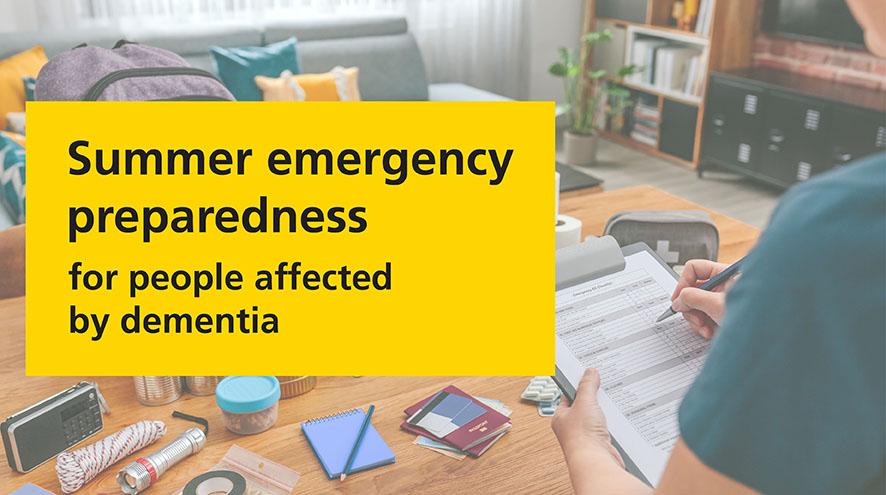Summer emergency preparedness
As we continue into the summer, extreme heat, and emergencies like wildfires and flooding, could happen unexpectedly.

Last updated: June 10, 2025.
While events like heat waves, wildfires and flooding have become regular occurrences, they can happen at any time and continue to pose considerable risks to public health and safety. Emergencies and resulting evacuations can be particularly challenging for people living with dementia to respond to and get the appropriate help they need.
Hot weather and dementia
Heatwaves can pose a significant risk to health and well-being. The frequency, duration and intensity of heatwaves have increased in the last 70 years and are predicted to continue to increase. In the summer of 2021, the province experienced an unprecedented heat dome. The highest temperature of 49.6°C was recorded in Lytton, B.C., on June 29, 2021, 4.6°C higher than the previous Canadian record temperature. Furthermore, as many homes do not have air conditioning, the high outdoor temperatures and intense solar radiation led to very high indoor temperatures.
A concern has been raised about the associated health-related risks, particularly for community members who are potentially more vulnerable. Research suggests that older adults and people living with dementia have an increased vulnerability to extreme heat. Factors that place people at risk during high temperatures include living with a disability, physical or mental illness, social isolation, a lack of access to resources, communication difficulties, and spending the majority of their time indoors. The heat can result in an increase in emergency room visits, hospitalizations and even death. Research also shows that higher temperatures may be associated with worsening the symptoms of dementia.
Coping with extreme heat
Given the rise of more frequent, intense, and longer-lasting heatwaves in the future, it is important to be aware of health protection measures during hot weather.
Here are a few quick tips to stay cool:
- Stay in areas with air conditioning, including community centres, shopping malls and any cooling centres set up by municipal governments.
- Drink plenty of water or juice throughout the day.
- Wear lightweight and light-colour clothing.
- Take note of signs of heat strokes and other heat-related illnesses.
Here are some more tips for living well with dementia during warm weather and heat alerts.
Preparing for emergency and disasters
Emergency situations like wildfires and flooding will disrupt the routine of someone living with dementia. In some cases, they have limited ability to understand what is happening and might be confused in an unfamiliar place during an evacuation.
Whether a person living with dementia resides in a care home or in the community, planning ahead is vital for alleviating the stress caused by the sudden changes in locations and environment, as well as supporting them to respond to situations more quickly.
While evacuation plans are essential, emergency kits are equally important. An emergency kit could include a wide range of items, from medication, identification, and copies of legal documents to a pillow or toy to hold for comfort.
Click here to check out the suggested list for the emergency kit.
It’s important to stay updated with current news and alerts with trusted media and authoritative sources, including the B.C. emergency alert messages sent to your wireless devices. If you know a pending emergency is about to happen, get yourself and the person living with dementia to a safe place. If the need to evacuate is likely, try to leave as early as possible to avoid heavy traffic.
Other tips to prepare for evacuations include:
- Alert your other family members, friends and health-care providers that the person living with dementia is relocating temporarily and provide contact information.
- Ensure that people other than the primary caregiver have copies of the person's medical history, medications, physician information and family contacts.
- Request additional medication prescriptions.
- If someone living with dementia uses oxygen, be sure to obtain portable tanks.
Tips for caregivers: How to respond during a disaster.
All things considered, remain calm, stay with the person living with dementia and reassure them that everything will be fine.
Read more: Disaster preparation and response
We are here for you
We are here to help families affected by dementia prepare for and cope with such extraordinary circumstances.
For additional questions and support, call our First Link® Dementia Helpline (toll-free):
- English: 1-800-936-6033 (Monday to Friday, 9 a.m. to 8 p.m.)
- Cantonese and Mandarin: 1-833-674-5007 (Monday to Friday, 9 a.m. to 4 p.m.)
- Punjabi, Hindi and Urdu: 1-833-674-5003 (Monday to Friday, 9 a.m. to 4 p.m.)
Webinar: Building climate resilience
In recent years in British Columbia, we have experienced a rapid increase in climate-related weather emergencies, including a heat dome, atmospheric rivers and wildfires. People living with dementia are uniquely at risk during climate emergencies. In this webinar, Dr. Jennifer Baumbusch talks about strategies that will help people living with dementia and their care partners during these events. Click here to watch the webinar.
